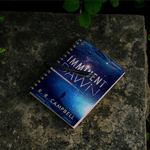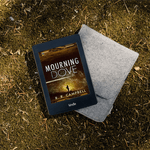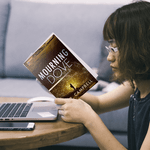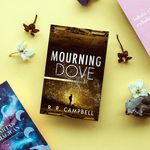R.R. Campbell's Blog, page 7
September 5, 2019
Coming Soon: R.R. Campbell at Great River Writes!
It’s been a couple of months since my last in-person writing workshop, which makes me all the more pleased to announce I’ll be conducting two seminars this October for Great River Writes!
Per their Facebook page, Great River Writes is a “collaboration between several literary and arts organizations in La Crosse, Wisconsin & Winona, Minnesota” that brings writing events to the Midwest!
The two sessions I’ll be leading that day are “I don’t know what to do with my hands” – Touching Up Scene for Characterization, Theme, and Backstory and Let’s (Not) Do Lunch: Pushing Our Settings Past Bars, Restaurants, and Cafes.
A full description of both courses can be found on the event page on Facebook.
This event is free and open to the public. For more information, please visit the event page link above.
Thanks again to Great River Writes for this opportunity. See you there!
September 3, 2019
This Week: R. R. Campbell in Milwaukee!
My first event in the Milwaukee area since the debut of Imminent Dawn is this Saturday, September 7th, 2019 at Mighty Con!
You can find full details about the event here, and don’t forget to RSVP that you’ll be swinging by my table during the course of the day.
As always, I’ll have books available to purchase and will be there to talk all things EMPATHY and sci-fi. Be sure to find me in the products pavilion and say hello!
If you can’t wait until this Saturday to get your hands on the first two books of the EMPATHY series (and I can’t blame you for not wanting to wait), you can buy them at the links below. And of course I’ll gladly sign any copies you’ve bought prior to the event at Mighty Con in September.
See you Saturday!
Imminent Dawn
Amazon | Barnes & Noble | NineStar Press | Kobo | Smashwords | Goodreads | Author Website
Mourning Dove
Amazon | Barnes & Noble | NineStar Press | Kobo | Smashwords | Goodreads | Author Website
It’s Time for a (Birthday) Giveaway!
To celebrate, I’m getting you something.
My birthday is coming up in October! To say thank you for joining me on this journey, I’m doing a number of giveaways available exclusively to subscribers to my newsletter.
Not a subscriber? Sign up before October to be entered in this giveaway!
What will you be eligible to win once you’ve signed up? I’ve got a list below!
Three (3) e-book copies of Imminent Dawn
Three (3) e-book copies of Mourning Dove
Three (3) e-book copies of Accounting for It All
One (1) signed print copy of Imminent Dawn (U.S. only)
One (1) signed print copy of Mourning Dove (U.S. only)
One (1) signed print copy of Accounting for It All (U.S. only)
One (1) half-hour one-on-one writerly consulting or brainstorming session
Three (3) first-ten pages critiques
Five (5) enrollments in one of my forthcoming online courses
Yeah, it’s gonna be an extravaganza!
If you happen to win a copy of one of my books that you’ve already read, don’t worry. We’ll make alternative arrangements to get you something of mine you haven’t read before.
Winners will be announced in the October installment of my newsletter, so stay tuned! Once the list of winners has been announced, I’ll email folks separately about claiming their prizes.
August 28, 2019
Now Teaching Through Stoughton Parks and Rec!
I’m thrilled to announce I’ll now be teaching, coaching, and consulting through Stoughton Parks and Recreation! I’m really grateful for this opportunity and look forward to becoming more involved in the local arts community.
If you’re unable to enroll in my in-person “Write Your Novel Now” course through the University of Wisconsin, you’ll still have a chance to be a part of this class (under a different name) through the Stoughton, Wisconsin Department of Parks and Recreation.
Course Description
Writing is always a challenge, especially when we’re unsure where to start or where we’ll head next. The good news? There’s a map to guide you and your characters to the story you seek!
In these sessions, writers will shed their fear of the blank page by developing their novels from scratch, journeying from concept creation to plot modeling and scene-by-scene outlining. After completing this course, attendees will be equipped with a map to confidently lead their characters from their ordinary worlds to the treasures they so long for.
Enroll in “Mapping Your Way to Story” through Stoughton Parks and Rec here.
FAQ
How much will this course cost? When and where will they be held?
The links above will have all the who, what, when, where, and how for these courses.
Are these courses available only in person?
For now, yes.
Will they ever be available online?
Yes, I’m actively working on launching a series of online classes.
When will they be available online?
Audio and video recording and editing is extremely time-consuming, and I want to make sure the final products are of the quality you’ve come to expect from my podcasts, in-person courses, editing services, and books. As such, I can’t provide a concrete timeline at this moment.
Thanks again to the Stoughton Department of Parks and Recreation for this opportunity! I’m looking forward to offering “Mapping Your Way to Story” this winter and expanding my offerings during the spring and summer of 2020.
Again, you can enroll in “Mapping Your Way to Story” through Stoughton Parks and Rec here.
August 27, 2019
Murder! The Literarily Literal
Kill your darlings, they say. Every writer has at least heard the phrase, and the interpretations of what it really means vary from deleting a favorite phrase to an entire beat or event. Those darlings aren’t what we’ll focus on in this post, however. Today, we’re talking murder—actual, literary murder.
In literature as in life, people die. George R.R. Martin is (in)famous for killing off his characters, as nearly any chapter in the A Song of Ice and Fire series can attest. It should go without saying that the impact of a well executed, literal character assassination can go a long way in creating emotional resonance and contributing to theme or character development, but how can a writer maximize that impact when they decide the time has come for one of their characters to meet their maker?
Though there are a number of approaches to creating a memorable end-scene for a character, I’d like to focus on the three main (poisonous?) ingredients that a writer can use to help achieve this goal: character appeal, timeliness of death, and manner of death.
Character Appeal (or Lack Thereof)
So let’s say you decide it’s time for Henchman #4 to stop carrying out orders and start pushing daisies. That’s fine, but who really gives half a hoot about him? He didn’t even have a name!
Well, he didn’t have a name to you, maybe, but he had a name to someone. And that’s the trick, really; we need to make our readers that someone, and we need the character in question to be a person that our reader can get behind (or root against!). Consider the following scenario.
As it turns out, Henchman #4’s real name is Dale. Dale has a wife and five kids, and only signed up to work for the evil Doctor Zygbo part-time because he needed a second job to help get his fifth child through school. Dale works days at the local Fun Mart for mere pennies over minimum wage, and at night, he toils for Zygbo, pushing buttons and flipping switches to further the doctor’s evil designs.
“But wait,” you might say, “even if he has all those other things going on, couldn’t he have picked up another shift at Fun Mart or gotten a job working as a janitor or something? Working for the evil doctor makes Dale a real jerk.”
I hate to break it to you, but the answer is no, he couldn’t have done those things. Fun Mart keeps its employees working under 32 hours a week to avoid having to provide health insurance, and the only other place in town that was hiring was the puppy mill. Did I mention Dale has a soft spot for puppies? Well, he does. He loves puppies almost as much as he loves his wife and five children. He would never work at the puppy mill and you should never adopt from one.
Now that we’ve established Dale is a generally upstanding guy who, as a matter of circumstance and personal conviction, just happened to get sucked into Doctor Zygbo’s hiring spree, let’s move on to the next major matter that could make his previously anonymous death that much more impactful.
Timeliness of Death
What I mean by timeliness of a character’s death has less to do with the day of the week and everything to do with where the character is at in their development arc. Where are they in their journey to accomplish their primary goal? What will the impact be of their success or failure as it relates to that goal?
Again, let’s bring this back to good old Dale—sweet, puppy-loving, father-of-five Dale. We’ll also add to the narrative that Dale got his job at Doctor Zygbo’s Death Emporium to earn extra scratch for his youngest daughter’s college education (she wants to be a veterinarian, you know).
What happens if we learn that he actually accomplished that goal months ago, and is now showing up for work out of simple habit at the time of his death? If you’re a knee-jerk victim-blamer (emphasis on “jerk”), you might say something like, “well, he should have quit when he had the chance” or “he got what he deserved for selling out to Zygbo in the first place.” Others might say it’s all the more tragic that he died after accomplishing his goal, as his death came about needlessly.
But what if, at the time of his death, he was still a year away from finally having saved up enough to send little Melanie (that’s her name now) off to college debt-free? What if, as he looked forward to counting down the months and weeks and days to accomplish this goal, his inner thoughts revealed a man increasingly more troubled with what he had to do for Doctor Zygbo on a nightly basis? Dale would be able to forgive himself someday, right? His family would forgive him if they ever found out where the money came from, wouldn’t they?
Lordy, even I’m starting to feel bad for Dale under that scenario.
Now let’s compare the impact those two possible scenarios would have on readers. In the first setup, his family would be crushed, of course, but as it relates to Dale’s primary goal, his daughter would be able to afford school, at least.
In the second scenario, however, not only does Dale’s family have to confront his loss, but Dale himself would have died before achieving the one thing he was willing to sacrifice his integrity for. On top of that, little Melanie would have to take out massive loans for her education, something her generally risk-averse personality would ultimately discourage her from doing. Without her veterinary degree, there’d be a far greater number of sick puppies lolling around, a further affront to her father’s puppy-loving memory. An extraordinary tragedy, folks. It’d be an extraordinary tragedy.
“Yeah, but emphasizing the impact of the second scenario feels like it’s affirming tragedy porn.”
For the unfamiliar, tragedy porn is that which relies on tragedy for the sake of tragedy to prove a broader point to a particular audience.
So, yeah… suggesting the second scenario above is absolutely superior could definitely be viewed as an affirmation of tragedy porn. That said, though I certainly fleshed out the consequences for that scenario more than the first, that’s not to say it’s the “one right answer” in cases like these.
As with all things writing, there’s plenty of room for nuance. The important takeaway here shouldn’t be that maximizing tragedy is One Hundred Percent the Way to Go , but rather that we ought to be deliberate about the choices we make in our storytelling. It would be perfectly valid to have Dale perish after having saved up enough for his daughter’s education (scenario one); the choice an author ultimately makes, however, all depends on they want to say in this moment and what they want readers to leave the page with.
, but rather that we ought to be deliberate about the choices we make in our storytelling. It would be perfectly valid to have Dale perish after having saved up enough for his daughter’s education (scenario one); the choice an author ultimately makes, however, all depends on they want to say in this moment and what they want readers to leave the page with.
Simply put, neither scenario is inherently superior to the other; judiciousness is where our focus ought to be.
That said, let’s proceed under the assumption Dale’s death comes before he’s saved enough for his daughter’s schooling, and let’s say you’re still one of those holdouts who says, “I don’t appreciate the nuance of individuals having to make ideological sacrifices in order to overcome oppressive circumstances. Dale is still a jerk because he worked for Doctor Zygbo.”
Well, strap in. This is where it gets real.
Manner of Death
When I say “manner of death,” I don’t mean what appears on the coroner’s report. What I mean is what the to-be-killed-off character was doing at the time of death. Did they do anything to bring about their own demise, directly or indirectly? Did they willingly accept their end as a sacrifice for others? Was their death a matter of mere happenstance, or could they have done something to prevent it? Again, let’s work with two scenarios, using the Dale-that-dies-before-achieving-his-goal as our foundation.
In our first scenario, Dale dies as a result of collateral damage when Good Guy finally arrives to dispose of Doctor Zygbo once and for all. Let’s say Dale gets shot in the bum with a laser weapon of some kind while attempting to take cover behind Doctor Zygbo’s Fun-sucking Funnel, for example. Bummer for Dale, right? Bummer for his family and kids and all those sick puppies of the future, right? Right. If only he’d had the courage or luck to escape unscathed. Oh, well. But what if…
finally arrives to dispose of Doctor Zygbo once and for all. Let’s say Dale gets shot in the bum with a laser weapon of some kind while attempting to take cover behind Doctor Zygbo’s Fun-sucking Funnel, for example. Bummer for Dale, right? Bummer for his family and kids and all those sick puppies of the future, right? Right. If only he’d had the courage or luck to escape unscathed. Oh, well. But what if…
…after years of toiling for Doctor Zygbo, Dale decides he can no longer sacrifice his ideals for his original objective? What if he decides that he’ll take out the final loans necessary to put little Melanie through school? What if he figures by the time he has to pay off those loans that the housing market will have recovered enough to sell the home he raised his children in, using that cash to help the last of his children achieve the dream of debt-free college?
Yeah, Dale decides. He’ll do it. It’s better than the alternatives, anyway. And not only that… Dale decides he can’t keep letting Doctor Zygbo get away with it. He can’t. keep. getting. away with it.
Dale, after plotting for weeks, finally sees his window of opportunity open. He approaches Doctor Zygbo from behind, drawing his standard-issue henchman wrench from his standard-issue henchman work pants. One bludgeon is all it will take, one swing to the back of Zygbo’s balding, rat-like scalp—
It’s then that a previously unseen bodyguard shoots Dale in the bum with some sort of laser rifle.
“But he was so close,” you might say. “He could have rid the world of Zygbo and helped his family! Oh, he had everything planned out! He was going to take out that loan and sell his house and little Melanie was going to become a veterinarian and all those sick puppies would have survived instead of being cast into the river!”
I know, right? See how you suddenly care about the man we once knew as Henchman #4?
That sudden investment in Dale didn’t come from nowhere. It came from the appeal of his character, the timeliness of his death, and the manner of his death. By manipulating those three variables alone, we went from the “whatever” death of some schmo with a wrench to the tragic ending of Dale, a man whose dedication was matched only by his integrity.
But What About That Lack of Appeal?
Ah, yes. I suggested this in a couple of points above, but let’s address it head on here. Throughout this post, we explored death through the lens of a sympathetic character, one for whom we’d want to root.
These same principles, however, can (and should!) be applied to antagonizing characters as well. The timeliness and manner of death for our villains is just as important as it is for our protagonists and their allies (or the allies of the antagonist, too).
In fact, the lack of appeal for the death or destruction of antagonizing forces can create a great deal of catharsis for our characters and our readers alike. Who doesn’t love the release of knowing a big baddie has been beaten for good?
Not Every Schmo Needs a Curtain Call
After reading this post, you might be concerned you need this deep, rich backstory for every last one of your villain’s hechmen or every last random villager who gets roasted by your manuscript’s terrifying dragon creature.
Despite the impression the last two thousand words might have created, you do not need every character death to hit us in the same way the death of a protagonist, antagonist, or one of their allies would. In fact, the death of an unnamed character shouldn’t carry the same weight as the departure of a prominent figure in our narratives.
Why use Henchman #4 a.k.a. Dale the Family Man and Puppy Lover as our example, then?
To demonstrate that it’s possible for even the most side-seeming of side characters to be three dimensional in their own ways—just in case you need that arrow in your quiver. Who knows? You might one day be surprised to find a character you thought would be a one-and-done has the potential to add a new dimension to a given scene or the manuscript as a whole.
Tell Me More
For now, let’s say R.I.P. to our pal Dale, that sweet, sweet man.
Having bid him adieu, I’m curious to know… how do you handle the deaths of the characters in your manuscripts? Do you make considerations similar to those described above? If not, what considerations do you make when it comes time for a character’s bell to toll? Tell me and others in the comments!
Did you enjoy this free resource?
Buy me a coffee to say thanks!
You can also subscribe to my newsletter, follow me on Twitter, Facebook, and Instagram, or check out my writing courses and editing services to learn more.
August 16, 2019
SE WI Festival of Books, Here I Come!
I’m thrilled to announce that on Saturday, November 2nd from 9 a.m. – 4 p.m., I’ll be at the University of Wisconsin-Milwaukee at Waukesha with dozens of other authors to help celebrate the best in literature from across the state, country, and beyond.
So come pay me a visit! This event is only weeks before the holiday shopping season officially kicks off, and there’ll be plenty of literature available for the readers in your life.
Oh, and if you swing by my booth, you can check out my new brain-in-a-jar while we chat all things sci-fi and bookish. As usual, I’ll of have copies of Imminent Dawn and Mourning Dove to sign and sell as well.
 Real jar. Fake brain.
Real jar. Fake brain.Don’t forget to RSVP on Facebook to let me know you’re coming!
Want to get your hands on either book before this event? You can find them at the links below.
Imminent Dawn
Amazon | Barnes & Noble | NineStar Press | Kobo | Smashwords| Goodreads | Author Website
Mourning Dove
Amazon | Barnes & Noble | NineStar Press | Kobo | Smashwords | Goodreads | Author Website
August 6, 2019
Appleton Monthly features Imminent Dawn!
I was thrilled to learn Imminent Dawn was recently featured in Appleton Monthly, a Fox Valley magazine with over 18,000 copies in circulation every month! As a lifelong Packer fan, it was additionally neat to be in an issue with Packers coach Matt LaFleur on the cover.
Thanks to Appleton Monthly for the blurb about Imminent Dawn. I’d like to thank Rebecca of Conquer Books for sending me a copy of the magazine as well. Definitely check out what she and Nicole have going on at Conquer Books and, if you’re in the Fox Valley area, be sure to get your hands on a copy of the August edition of Appleton Monthly!
If you haven’t yet snagged either of the first two books in the EMPATHY series, you can find them at the links below.
Imminent Dawn
Amazon | Barnes & Noble | NineStar Press | Kobo | Smashwords| Goodreads | Author Website
Mourning Dove
Amazon | Barnes & Noble | NineStar Press | Kobo | Smashwords | Goodreads| Author Website
August 5, 2019
Thank You, Mighty Con Madison!
Thanks so much to everyone who came out to show their support at Mighty Con in Madison this last weekend! I had a blast chatting with all of you, and of course I’m extra grateful for those of you who grabbed copies of Imminent Dawn and Mourning Dove.
Oh, and I got to meet Twitter friend and fellow author L.A. Wasielewski, who was, by coincidence, seated right behind me at her own table. And we managed to get a photo, too!
 Me (left) and L.A. Wasielewski (right) at Mighty Con Madison.
Me (left) and L.A. Wasielewski (right) at Mighty Con Madison.The best part? We get to do it all again at Mighty Con Milwaukee in early September! You can learn more about the Mighty Con in Milwaukee at this link or RSVP to it on my event page on Facebook.
And if you haven’t yet grabbed your copies of either of the books in the EMPATHY series published to date, you can find them at the links below!
Imminent Dawn
Amazon | Barnes & Noble | NineStar Press | Kobo | Smashwords| Goodreads | Author Website
Mourning Dove
Amazon | Barnes & Noble | NineStar Press | Kobo | Smashwords | Goodreads| Author Website
August 2, 2019
The Secret’s Out: Your Books, Beautifully Shopped
This post contains affiliate links. For more information, see my disclosures here.
If you’ve visited this site or my social media profiles before, you’ve likely noticed scores of high-quality images of my books in a number of picturesque settings. This might have had you wondering…
Who did r.r. pay to take those photos? How much did he have to fork over? Was what he paid possibly worth it?
I’ll let you in on a secret.
I didn’t pay a photographer for those photos, and I was able to create them for far less than you might think.
How did I make the amazing photos below? Mockup Shots.









What’s Mockup Shots?
Mockup Shots is online software by Adazing that lets you upload your covers to create high-quality images of your book(s) for marketing and publicity purposes.
Using Mockup Shots has helped me further develop my brand and sharpened my web presence, whether it be on Twitter, Facebook, Instagram, or this site. Not only that, but it’s saved me tons of time; whenever I need a stunning new photo of one of my books, I can simply hop into Mockup Shots and generate one in minutes.
Sound awesome? It is.
Want to see your books in a mockup shot? Now you can.
At this link, you can upload your cover image and get three free mockup shots in return. More interested in a gif similar to the below? Click here. Interested in both still images and a gif? Take advantage of both links!
[image error]
Whether or not you take advantage of the three free images or the free gif, Mockup Shots is currently running a deal where you can get lifetime access to the full library of mockups (including the new ones they add each month) at a reduced price. So don’t miss out; get in on this deal while it lasts!
Which of the hundreds of available mockup shots are you most interested in based on what you’ve seen above? How do you see this changing your web presence for the better? Let me know in the comments.
Like what you’ve read here? You can subscribe to my newsletter to get more articles like these throughout the year. And don’t forget to follow me on Twitter, Instagram, and Facebook, too. You can also meet me at any one of my upcoming events, or reach out about having me speak at one of your own.
July 29, 2019
“Nice follower count you’ve got there. Sure would be a shame if its value were diluted.”
Take to the internet!
Or so goes nearly all platform-building advice, at least all the advice I’ve heard since I came to the world of writing in 2013.
I’ll admit I was a social media skeptic for a time. How are we supposed to focus on our writing if we’re also meant to be tweeting our every thought, Instagramming our every read, and pinning our every book aesthetic?
Oh, and you need to be on Facebook. You must have a fan page on Facebook.
Even across the vast expanses of cyberspace, I can feel a few of you readers already leaning in, eagerly anticipating a declaration of social media is useless! Forsake it entirely and focus only on your manuscripts!
Unfortunately, I can’t do that. You are going to want to build a platform, and you need to start doing that before you’ve got an agent or signed a book deal.
This truism has led thousands of writers to take to their preferred social media hubs, keen to amass hordes of followers with the dream of their follower quantity being just enough to convince an agent or editor to take them on when they otherwise might not.
As a result, much of the writing community (especially on Twitter) has devolved into endless “follow back pacts” and “comment on this post so we can all follow each other” trains. This way everyone is meant to end up with massive follower counts, and those who participate will have tens of thousands of people ready to click “buy” on the date of their first book’s release. Perfect, right?
Wrong.
There are three fundamental flaws to these approaches, the first of which being that if everyone ends up with fifty-thousand followers from these schemes, it means… nothing. One hundred thousand followers becomes the new fifty thousand followers becomes the new twenty thousand followers and so on and so forth all the way down.
To use a comparison to the world of economics, it’s like printing more money in the interest of eliminating poverty; sure, we all might end up with a million dollars, but the printing of all these extra bills will just cause an increase in the price of goods. What you used to be able to buy with a dollar will now cost five or ten or fifteen.
The second flaw to these feverish followership rackets has to do with engagement. If everyone is following everyone else simply to pump up their numbers, how many of those people have you engaged with meaningfully enough to create a true community of support? How many of them can you maintain a regular relationship with? How many of them are actually interested in your genre or you as a person?
If you’re on Twitter, start keeping an eye on how many people engage with the tweets on your timeline (these engagements include comments, likes, or retweets). See a tweet with a few dozen engagements? Check out how many people are following that person.
If they’ve got a hundred followers, wow! The people who are following them for their tweets are truly interested. If they’ve got a hundred thousand followers… what? That means well fewer than one percent of their followers are actually engaging with them. Doesn’t that look… sad? In some (many) ways, that undercuts one’s social media credibility more than an inflated follower count could ever bolster it.
Thirdly, the make up of one’s followership (audience) is of critical importance as well, something these follower exchanges overlook entirely. If ten thousand writers are following ten thousand other writers who are simply following them back, how will you reach… readers?
Granted, writers are readers by their nature (at least I hope so), but, as I suggested earlier, how many of the writers following you are interested in your genre? How many of them read in your category? How many of them can afford to buy the books of all ten thousand people they follow who are also following them back?
It’s silly. Really, really silly.
By now, you’re probably circling back to, “Well, r.r., if you’re such a social media curmudgeon, how can you still possibly claim it’s important to build an online platform?”
Because it is—it’s just no longer as “simple” as standing atop a mountain of fifty-thousand followers and expecting someone to offer you a publishing deal (another myth since one’s story, it turns out, is actually the most important component in signing with an agent or editor).
At this point in time, engagement is what counts more than follower quantity. In my view and that of others, it’s better to have a hundred ravenous supporters than a hundred thousand followers who hardly recognize your profile picture when it shows up on their feed. Simply put, it’s “quality over quantity.”
That’s all fine and good, but how do we get to quality?
By being ourselves. Like attracts like, as they say, and this is true regardless of the social media platform any writer chooses to make the cornerstone of their platform.
For example, are you great at photos but not at short, clever one-liners? Focus on Instagram over Twitter. Love video but loathe blogging? Start a YouTube channel with weekly updates instead of putting those updates down in writing. Prefer private communication to public chest-pounding? Build up your email list instead of shouting into the vacuousness of cyberspace.
There are so many unique ways to assemble one’s platform these days, the beauty of which is we can use the tools we’re most comfortable with to build it.
And in my view, that knowledge is worth more than any follower count.
What outlets do you emphasize in your online platform? Why did you choose the outlets you chose? Have you considered a shift in your emphasis at one time or another? Why or why not? Tell me in the comments!
Like what you’ve read here? You can subscribe to my newsletter to get more articles like these throughout the year. And don’t forget to follow me on Twitter, Instagram, and Facebook, too. You can also meet me at any one of my upcoming events, or reach out about having me speak at one of your own.




